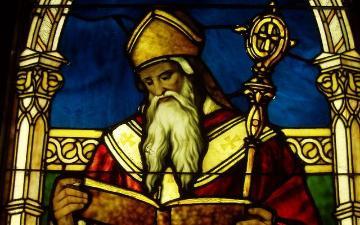
Photo licensed under the Creative Commons Attribution-Share Alike 3.0 Unported license. Tiffany stained-glass window of St. Augustine, in the Lightner Museum, St. Augustine, Florida.
David E. DeCosse (@DavidDeCosse) is the director of the Religious & Catholic Ethics and Campus Ethics programs at the Markkula Center for Applied Ethics. Views are his own.
Love and politics hardly seem to inhabit the same world. But in the aftermath of one of the most contentious presidential elections in American history, it’s time to reflect anew on the possible co-existence of such fundamentals. In the face of great division, can love help foster among the American people what the Preamble to the Constitution hopes the Constitution can do: “form a more perfect union”?
The rap against mixing love and politics is long and varied. For many on the right, a so-called soft virtue like love has no business in the hard world of policy. In this view, for instance, compassion for children separated from their parents at the border is misplaced sentimentality. What migrant families need to stay in their home country instead of risking everything to come to the United States is the hard prod of perhaps the most elemental fear—that someone will take away your children.
For many on the left, love appears in politics as either a theological threat or a moral evasion. In this view, liberals fear regimes inspired by religious visions of divine love that run roughshod over the rights of non-believers. Or progressives look with alarm at a politics that prizes familial love in terms of traditional morality but that leaves the resolution of great questions of social justice to the indifferent mechanisms of the free market.
At first glance, the brute cynicism of contemporary American politics leaves no room for love. But our fracturing world demands that we create such space. Love points toward raw fundamentals and ultimate aspirations. And we need now to engage such things.
The ancient Christian theologian St. Augustine of Hippo had much to say to our times about these matters. Augustine wrote from North Africa as the Roman Empire was collapsing around him. His political theology was less concerned with structures than with the vast moral and spiritual choices that both constitute an empire and cause its collapse. We are not ourselves in a state of disintegration similar to what Augustine saw. But we can feel the fissures opening. Witness an ideology of freedom embraced by millions that rejected mask-wearing in a viral pandemic (a rejection not even consistent with classic liberal theory about not doing harm) and thus contributed to the highly preventable deaths of tens of thousands of fellow Americans.
Augustine understood love as akin to desire: As an inclination or valuation or “weight” (as Augustine often called love) that draws us to good or evil. We all love. And what we love deeply affects, if not determines, what we know. Moreover, some loves are better than others. Chiefly, for Augustine, our better loves are inclined toward things that are true and just; shared by more people; and that last, even to eternity. One scholar explained that for Augustine to love properly something as one’s own—think, for instance, wealth—meant that what one loved belonged also in some fashion to others—think, for instance, the poor who could benefit from such wealth.
Augustine paired his varied notion of love with a vivid understanding of sin. All our loves are hobbled from within. Even our better loves have the potential for turning destructively inward. We face the constant temptation to seize things for ourselves—freedom, money, even God—instead of understanding such goods as belonging also to others. And our worse loves put our “weight” in wrong itself: We can love the cruelty of separating children from their parents for the sake of cruelty itself. Moreover, love and hate battle like two great rivals stirring ever more intense opposition for control of the soul. Thus a love for power in itself fires hatred for truth, transparency, integrity—all those things that yoke power to accountability.
The breadth of Augustine’s conception of love provides a helpful way to understand where we are in our politics now and where we might go. On its face, there are many explanations for our slide from a politics founded on the rule of law derived from the consent of the people to a politics increasingly guided by the rule of allegedly legitimate violence. We see this slide all around us in old and new ways: In a police officer kneeling on the neck of George Floyd to the point of asphyxiation; in what political philosopher Hannah Arendt called the violence of in-your-face political lies in press conferences and campaign ads; and in the concerted attempt to use raw power to overturn the results of a presidential election. Here are instances of what Augustine called the libido dominandi or the lust to dominate other persons and to control the truth.
Augustine also provides a way to think about the road ahead. In one of his most famous formulations, he said that a people is “a gathered multitude of rational beings united by agreeing to share the things they love...The better the things, the better the people; the worse the things, the worse their agreement to share them.” So what are the indispensable things that the American people ought to love and, by doing so, form a more perfect union? For Augustine, these are things that will be founded on truth; that are capable of being both one’s own and shared with all others; and that hold the promise of lasting. He doesn’t tell us what these things are. But he does tell us to love truly. And he knows that such a choice is fraught with the possibility of failure.